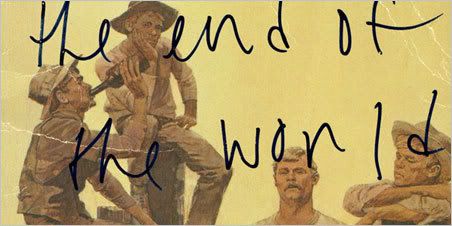
“I Don’t Wanna Lose“
from the album French Exit
2008
iTunes
The End of the World, a Brooklyn-based indie rock duo, first drew attention for “This Little Theater,” a song off their 2005 self-titled EP. Featured in the remake of The Manchurian Candidate, the song was given high praise by critics, leading The Village Voice to dub it the best song to come out of Brooklyn that year. The next year saw the release of their first full-length album, entitled You’re Making It Come Alive, which was again welcomed with open arms by critics and fans.
This year, the band releases their follow-up album, French Exit, which in laymen’s terms means leaving without saying goodbye. The title captures perfectly the album’s theme of loss and regret that attends the move from adolescence to adulthood.
French Exit starts off with an excerpt from one of their concerts. “Get more sentimental!” someone in the crowd shouts, most likely in jest. Sentiment abounds, however, when listening to French Exit. An undercurrent of loss and lessons learned the hard way run throughout the album. “Most of the record is very much about our lives, our friendship and our friends in general,” guitarist Benjamin Smith says. “It’s definitely a growing up, life choices type of record.”
Whether the music soars with pop-rock bliss, as on “Jody” and “I Don’t Wanna Lose,“ or shimmers with a haunting country twang as on “Learning,” there is an honesty at the album’s core, thanks to drummer/singer Stefan Marolachakis’ soaring and heartfelt voice and guitarist Benjamin Smith’s cross-breeding of pop, rock, folk, and country. Of course, that was the plan from day one when the duo sat down to make French Exit. “When everything else is removed and it’s just the two of us, there’s a good line of communication there,” says Marolachakis. “It made it easier to make a record that felt honest and clear.”
Honesty, earnestness, sentiment. The words bring to mind images of countless emo bands. But make no mistake — the End of the World isn’t a My Chemical Romance or Good Charlotte knock-off. Their music is honest, earnest, and sentimental in the tradition of Neil Young or Bob Dylan. Marolachakis foregoes emo’s tendency for pretense and smarminess in favor of the folk singer’s penchant for down-to-earth storytelling.
Listening to Smith’s guitar work accompany Marolachakis’ searing vocals evokes a sadness and pain that cuts straight to the heart. The sadness and pain shine best on “Learning” and “Someone Else’s Dollar,” where Smith takes a less-is-more approach to the guitar. The duo strike raw nerves with these tracks. In a sense, “Learning” and “Someone Else’s Dollar” are the strongest songs on the album because they are so raw and overwhelm your senses.
Thankfully, the entire album isn’t so emotionally raw. Tracks like “Jody” and “Section House” sound more upbeat, thanks to Smith’s sturdy pop guitar riffs (which sound, at times, like they were taken from a Strokes album). Indeed, Smith’s pop sensibilities on the guitar take the edge off of Marolachakis’ penetrating voice, making it easier to listen to French Exit from start to finish without falling into a bout of sadness.


